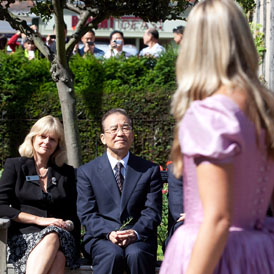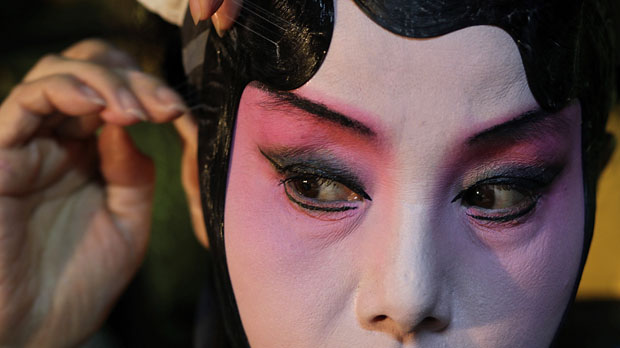Brush up your Lu Xun – Chinese literature for beginners
Quoting the greats of Chinese literature could be the key to boosting Britain’s links with the emerging economic giant, Wen Jiabao has hinted. Channel 4 News takes a crash course.

China’s Premier Wen Jiabao has thrown down a challenge for Britain’s political leaders as he continues his visit to the UK.
In between announcing lucrative new trade deals between Britain and China, Mr Wen, who is reportedly a keen student of Shakespeare, was treated to a special performance at the Bard’s birthplace in Stratford-upon-Avon.
After watching actors perform extracts from Hamlet, he made the point that his knowledge of English literature was unlikely to be reciprocated by the UK’s political leaders.
Mr Wen said: “Only those political leaders who respect the history of other countries and the creativity of the people of other countries will be able to lay a foundation for fostering friendship with other countries.”
With a view to boosting Anglo-Chinese relations, Channel 4 News spoke to Professor Michel Hockx, a leading expert on Chinese literature at London’s School of Oriental and African Studies, who gave us his ultimate namedropper’s guide to China’s classics.
1) The Peony Pavilion by Tang Xianzu
An almost exact contemporary of Shakespeare, Tang (family names first) was a playwright who died in the same year as the Bard.
This delicate love story is sometimes compared to Romeo and Juliet.
But people who have trouble staying awake during Jacobean tragedy should be warned: a full-length version can clock in at more than 20 hours.

Prof Hockx said: “Every Chinese schoolchild ought to know a few lines of this play, although nowadays you never know. Literature is a dwindling subject all over the world.
2) The Dream of the Red Chamber by Cao Xueqin
Also known as The Story of the Stone, Cao’s 18th-century masterpiece remained unfinished at his death, and other authors have written dozens of alternative endings.
The 80 chapters Cao did write sealed his reputation as a literary master, and the book has a whole field of academic study named after it: ‘Redology’.
Prof Hockx said: “This is the most famous classical Chinese novel, and the one you need to read if you’re interested in cultural heritage and what seems to be important to Chinese people as part of their culture – if you want to know more about Chinese family life and how the Chinese elite was living and the influence of Buddhism and Taoism.
“It’s a massive novel of 120 chapters, about a huge traditional Chinese family. Everybody in China knows it and everybody knows the famous passages. It was translated for the Penguin Classics series a while ago. If Westerners know anything about Chinese literature this tends to be one of the works they know.
3) Lu Xun
Lu died in 1936 and never saw the birth of Communist China, but that didn’t stop the party praising his work after his death. A writer of poems, short stories and essays, Lu’s style bridged classical Chinese conventions and writing influenced by modern European literature.
Several major anthologies of his work have been translated into English since the 1960s.
4) The Romance of the Three Kingdoms by Luo Guangzhong
A masterpiece from the early days of the Ming Dynasty, Luo’s sprawling historical novel features almost 1,000 characters.
Its focus on war, intrigue and political power struggles mean it remains a favourite among strategists. It has even inspired a string of video games.
Prof Hockx said: “Read this if you want to understand the competitive aspects of Chinese culture. A lot of the stories are used as examples of strategic thinking. Mao Zedong was a great fan of this novel and he sometimes quoted from it when coming up with strategies.”
5) The Water Margin
This enduring classic, which follows the adventures of a band of 108 outlaws in the Song Dynasty, has had a huge impact on Asian popular culture, providing the plot for countless comic books, Japanese Manga cartoons and ’70s Hong Kong martial arts flicks.
It’s one of the Four Great Classical Novels of Chinese writing, the other three being the Romance of the Three Kingdoms, the Dream of the Red Chamber, and Journey to the West, best known to Britons of a certain age as the Buddhist epic that inspired the 70s TV series Monkey.
Prof Hockx said: “You might recognise some of the scenes from old kung fu movies. A lot of the stories have been used in plays, TV series and films.”
-
Latest news
-
Taylor Swift’s new break-up album breaks records3m

-
NHS trust fined £200K for failings that led to death of two mental health patients3m

-
Sunak vows to end UK ‘sick note culture’ with benefit reform3m

-
‘Loose talk about using nuclear weapons is irresponsible and unacceptable’, says head of UN’s nuclear watchdog3m

-
‘There wasn’t an Israeli attack on Iran,’ says former adviser to Iran’s nuclear negotiations team7m

-




